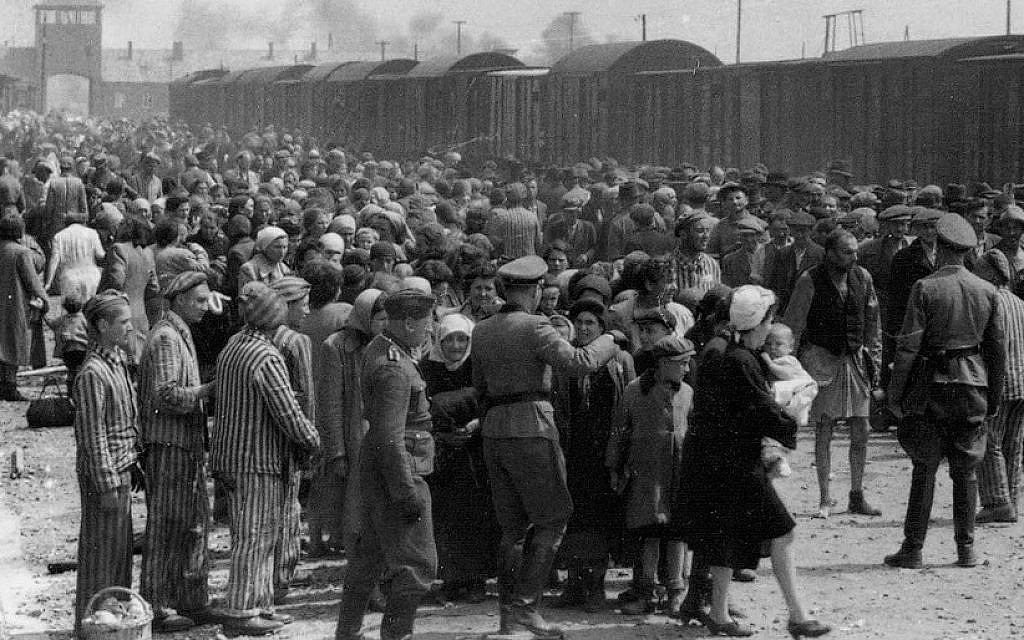Learn about the history of the Palestinian struggle for freedom, equality and justice by exploring major events in the history of their oppression on this day of the year.
21 May
ISRAEL DEFENDED ZIONISM'S BETRAYAL OF EUROPEAN JEWS 
On this day in 1960, Adolf Eichmann, who organised the extermination of Hungary’s Jews, was snatched to Israel. During WWII Rudolf Kasztner, a Hungarian Zionist leader, negotiated with Eichmann for 1,684 Jews to leave for Switzerland in exchange for misleading the majority on the fate that awaited them. In 1953 the Israeli Government unsuccessfully sued Malchiel Gruenwald for accusing Kasztner of being a collaborator. The judge said Kasztner, who was assassinated in 1957, “had sold his soul to the devil”.
إسرائيل تدافع عن الصهيونية لخيانتها يهود أوروبا
21 مايو
في مثل هذا اليوم من عام 1960 ، تم اختطاف أدولف أيخمان ، الذي نظم إبادة يهود المجر ، إلى إسرائيل. خلال الحرب العالمية الثانية ، تفاوض رودولف كاشتنر، الزعيم الصهيوني المجري ، مع أيخمان لمغادرة 1684 يهوديًا إلى سويسرا في مقابل تضليل الأغلبية بشأن المصير الذي ينتظرهم. في عام 1953 ، رفعت الحكومة الإسرائيلية دعوى قضائية غير ناجحة على مالشيل جرون -وولد لاتهامه كاشتنر بأنه متعاون. وقال القاضي إن كاشتنر ،الذي اغتيل عام 1957،"باع روحه للشيطان".
In 1953 the Ben-Gurion government prosecuted an elderly pamphleteer, Malchiel Gruenwald, for having libelled Rezso Kasztner as a collaborator for his dealings with Eichmann in 1944. The trial had considerable international coverage throughout 1954. Eichmann must have followed it in the press, for he described his relationship with Kasztner at length in taped interviews he gave to a Dutch Nazi journalist, Willem Sassen, in 1955, parts of which were later published in two articles in Life magazine after his capture in 1960. Gruenwald had denounced Kasztner for having kept silent about the German lies that the Hungarian Jews were only being resettled at Kenyermezo. In return, he was allowed to organise the special convoy, which ultimately became a train to Switzerland, and place his family and friends on it. Further, Gruenwald claimed, Kasztner later protected SS Colonel Becher from being hung as a war criminal by claiming that he had done everything possible to save Jewish lives. Eichmann described Kasztner as follows:
"This Dr Kastner was a young man about my age, an ice-cold lawyer and a fanatical Zionist. He agreed to help keep the Jews from resisting deportation – and even keep order in the collection camps – if I would close my eyes and let a few hundred or a few thousand young Jews emigrate illegally to Palestine. It was a good bargain. For keeping order in the camps, the price of 15,000 or 20,000 Jews – in the end there may have been more – was not too high for me".
Pro-Israel activist and historian Paul Bogdanor set out to work on the book almost a decade ago in a bid “to prove Kasztner’s innocence.” He was tired of seeing Kasztner’s name come up repeatedly in anti-Zionist propaganda. but was “extremely shocked” to find that everything pointed towards Kasztner’s having been “a collaborator” with the Nazis.
Kasztner was a leader of a small Zionist grouping in Budapest towards the end of World War II. He led a Jewish rescue committee which, before the Nazis entered Hungary, did succeed in saving the lives of a number of Jews. But once the Nazis arrived, Kasztner, an ambitious lawyer, became embroiled in prolonged negotiations with the Nazi leadership, particularly Adolf Eichmann.
After complex dealings with Eichmann, Kasztner succeeded in getting the Nazis to agree to the deportation of a group of 1,684 Hungarian Jews [to Palestine], the so-called “Kasztner Train,” who eventually ended up in freedom in Switzerland. But thousands more continued on the doomed path to Auschwitz. Bogdanor says that not only did Kasztner know they were being sent to their deaths, but that he actively kept such information secret from other Jews in Hungary and the wider Jewish world.
When Adolf Eichmann was flown out of Argentina on an El Al flight, both the US Central Intelligence Agency (CIA) and the West German Federal Intelligence Agency (BND) had known that Eichmann was hiding in Argentina, but were concerned about what Eichmann might say about West German national security advisor Hans Globke, who had co-authored the Nazi Nuremberg Laws and then gone on to enjoy an illustrious career in German democratic politics after 1945. Both agencies had used some of Eichmann's former Nazi colleagues.
According to Der Spiegel, The arrest took German Chancellor Konrad Adenauer by surprise. Would Eichmann incriminate cabinet ministers and officials in Bonn? The BND, Germany's foreign intelligence service, was instructed to find out how much the prisoner knew about "public figures in the Federal Republic of Germany." And Defense Minister Franz Josef Strauss threatened the Israelis that if they did not protect Bonn in the Eichmann trial, important arms deals would fall apart.
The Nazi bureaucrat of extermination stated that he was guilty of arranging the transports, but he did not feel guilty for the consequences. During Eichman's trial, prosecutor Hausner produced a quote by Eichmann in 1945 stating: "I will leap into my grave laughing because the feeling that I have five million human beings on my conscience is for me a source of extraordinary satisfaction". Eichman accepted these were his words.
Israeli writer, journalist and peace activist Uri Avnery (d 2018) on Kastner's relations with SS Col Becher
